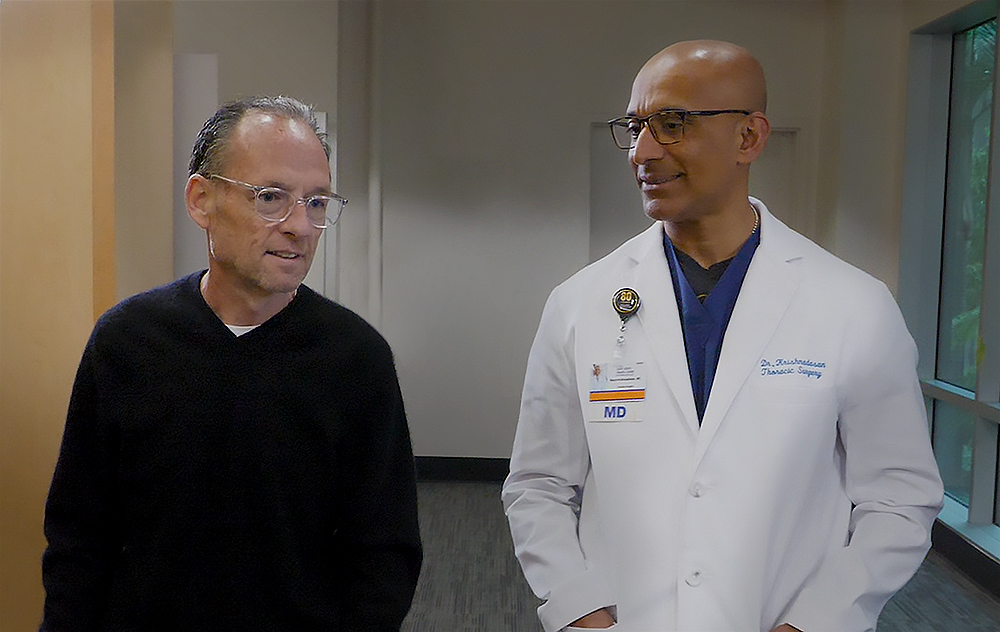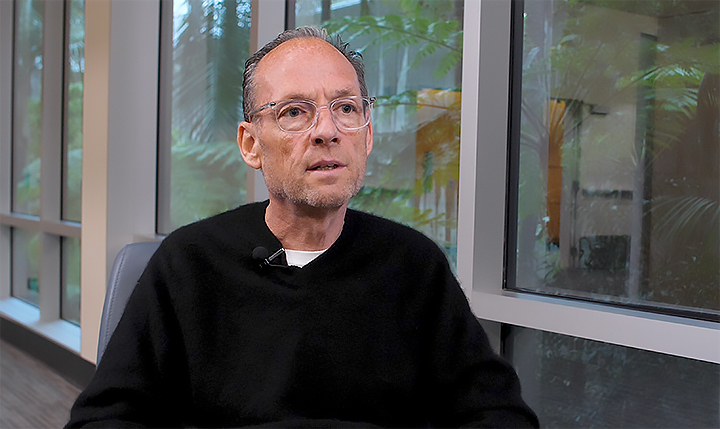
What is it like to have Esophageal Cancer?
Jack’s challenge with swallowing food progressively worsened, causing him immense discomfort; acid reflux made it unbearable at times. He attempted to schedule an endoscopy as soon as possible at a hospital other than Saint John’s. However, the appointment became an endeavor met with undesireable delays. Unbeknownst to Jack, the trouble he had swallowing was due to a sizable tumor in his esophagus.
Unhappy with the time frame of waiting a month or more to understand the cause of not being able to swallow, Jack was referred to Saint John’s Health Center by a friend who is regarded as highly knowledgeable about medicine and experts. While at Providence in Santa Monica, Dr. Bedford, a gastroenterologist, performed an endoscopy on Jack, a procedure done under anesthesia. Dr. Bedford then referred Jack to an expert gastrointestinal surgical oncologist, Dr. Anton Bilchik. Dr. Anton Bilchik is Chief of General Surgery at Saint John’s Health Center, Director of Gastrointestinal Tumors and Disease Research at Saint John’s Cancer Institute, and who also practices at the Digestive Health Institute, Providence.
Jack was diagnosed with stage 3 esophageal cancer in late August 2022 at 54 years old. He started chemotherapy a week later in early September. His chemotherapy lasted 6 weeks followed by 30 days of radiation and 60 days of rest before his surgery. His multidisciplinary team included two surgical oncologists, Dr. Anton Bilchik, and Dr. Baiya Krishnadasan, Dr. Sean Fischer, his medical oncologist, and Dr. Robert Wollman, his radiation oncologist. Jack is currently on adjuvant immunotherapy, OPDIVO®, for which he will remain on for one year which is given intravenously once every month. Emerging data suggests there is a benefit to adjuvant immunotherapy after standard chemotherapy and radiation, according to Dr. Baiya Krishnadasan.
Jack now had two expert surgical oncologists on his side.
Yeah…two experts.
Dr. Baiya Krishnadasan, a recent transplant from Seattle, Washington, is a proctor for the da Vinci Robotic Surgical System who teaches how to perform minimally invasive robotic thoracic surgery and esophagectomies. Jack comments, “I get a phone call from Dr. Bilchik. ‘We’ve been speaking to another surgeon. I’d like him to be part of the team. We’ve been looking to have him join the team for quite some time.’ If Dr. Bilchik feels the need for another surgeon, why in the world would I ever say no?”
Why did Dr. Anton Bilchik recommend Dr. Baiya Krishnadasan to perform the surgery instead of himself? Jack’s surgery was the first minimally invasive robotic assisted esophagectomy at Saint John’s Health Center, and performed by Dr. Krishnadasan, one the country’s leading robotic thoracic surgeons. The tumor Dr. Krishnadasan removed was between 8-10 centimeters. He also removed most of the esophagus and replaced it with a gastric tube that was brought up to the upper chest and replaced part of his stomach. A smaller stomach requires Jack to eat 4-6 smaller meals a day, an adjustment he didn’t mind making. “Jack did very well after a really large and complicated operation,” said Dr. Krishnadasan.
According to Jack, “Traditional esophagectomies are usually 6-9 hours, and [Dr. Krishnadasan’ s] are half that time.”
I understand I was the first… fully robotic esophageal surgery… but it wasn’t just Dr. Krishnadasan; he came with an extensive resume. I attribute to me being alive today to that medical team, and their ability to navigate these tough waters.
– Jack
It’s been eight and half months from the date Jack was diagnosed with stage 3 esophageal cancer, and just a month ago, he started cross fit and now goes out to dinner regularly with his wife. Although there are restrictions to both going out and working out, he can now determine the outcome of his life himself.
Listen to Jack recall his experience with his multi-disciplinary team of experts
Esophageal Cancer Awareness
“Statistically, sitting here today is a long shot to a certain degree because this disease gets misdiagnosed, or pushed down the road further, and then you’re at a point of no return,” Jack lamented in his testimony. He’s right, esophageal cancer has a high mortality rate due to late-stage diagnosis. According to ASCO (American Society of Clinical Oncology), in 2023 approximatley 21,560 adults will be diagnosed with esophageal cancer in the U.S., and of those diagnosed, 16,120 will pass from the disease. This disease has a very low survival rate, approximately 21 percent 1.
To learn more about esophageal cancer prevention, hear it from Dr. Baiya Krishnadasan in this Blog.
Advice From Jack
- It’s a mental game.
- I never googled anything after the first time, because I read horrible things.
- There’s nothing I can do, it’s the medicine and the doctors.
- The hospital bed doesn’t care who you are. Whether you’re a billionaire, homeless or somewhere in between, it doesn’t matter.
- When you have cancer, nothing matters except for, how do I get better?
- I was able to find a team, and they jumped on [my health] with a sense of urgency. The other hospital didn’t seem to understand the sense of urgency, or least for scheduling. Here they made me a priority and I attribute that to going to the gym and to going out to dinner with my wife.
- My wife was my light house. There were days that were very dark, and very challenging.
I could read it in their eyes that I was not in the best of shape on day one. Now, I’m in far better shape and their confidence levels are much higher, and my confidence levels is extremely high, so, thank you.
– Jack


